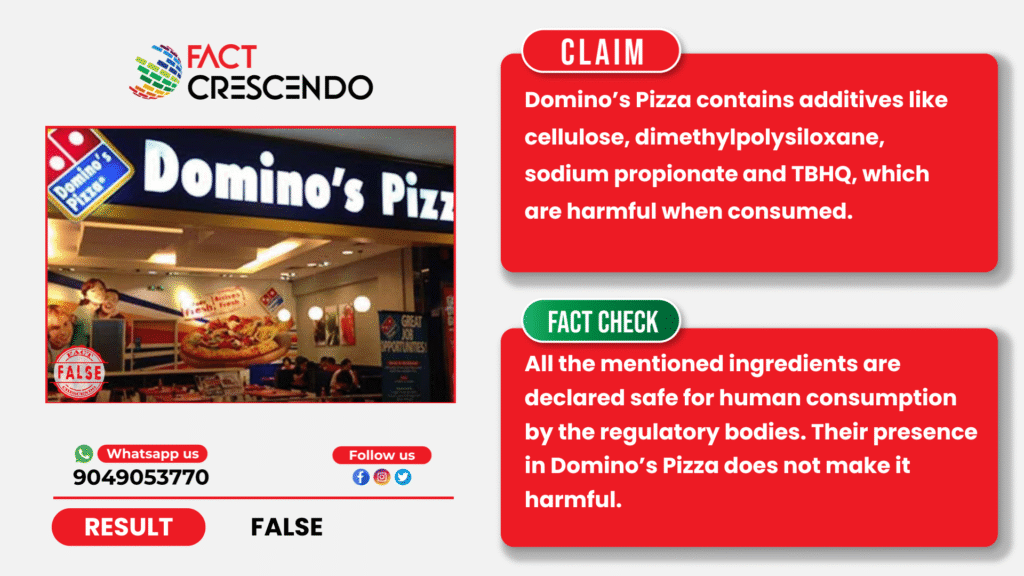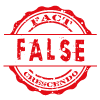
Domino’s Pizza is one of the world’s largest pizza chains, founded in 1960 in the United States. Known for its fast delivery service and customizable pizzas, Domino’s has found its place in people’s plate. However, in recent times, growing consumer awareness has led to concerns about the possible use of harmful ingredients in Domino’s pizzas.
Recent social media posts had pointed out that Domino’s Pizza uses harmful additives like cellulose, dimethylpolysiloxane, sodium propionate and TBHQ. It was stated that these ingredients cause inflammatory bowel disease, cancer, disrupts hormones, and harms the immune system.
However, Fact Crescendo found the claim to be false. Domino’s Pizza is safe to consume and all the mentioned ingredients are declared safe by regulatory bodies.
Fact Check-
Let’s check the safety of each ingredient mentioned in the post.
Cellulose:
Cellulose is a food additive made from parts of the plants. It’s typically produced by treating these plant materials with a mild acid and salt, then filtering and drying into a fine powder. Only a small amount is used to keep foods moist, improve texture, and keep ingredients like oil and water from separating. It’s often used in baked goods and beverages
The European Food Safety Authority (EFSA) reviewed the safety of various cellulose-based food additives, including microcrystalline, powdered, and modified celluloses such as methyl and carboxymethyl cellulose. These substances are not absorbed by the body and are excreted. EFSA found no evidence of toxicity, cancer risk, or harm to reproduction or development, even at high doses used in animal studies. The EFSA found that the estimated human exposure levels were well within safe limits and concluded that there is no need for a specific acceptable daily intake (ADI). Overall, cellulose and its derivatives are considered safe for use in food at current usage levels.
DIMETHYLPOLYSILOXANE:
The EFSA Panel reviewed the safety of dimethyl polysiloxane (E 900), a food additive approved in the EU. Earlier limits set the acceptable daily intake (ADI) at 1.5 mg/kg body weight, but new studies showed very low absorption in the body as almost all of the additive gets excreted. It has low toxicity and no genotoxic effects. Eye issues were found in animals due to the direct contact of the additive and not ingestion. A long-term rat study found no harmful effects at up to 1,742 mg/kg/day, leading the Panel to raise the ADI to 17 mg/kg/day and withdraw the old limit. Estimated exposure from food is far below this new ADI, so there is no safety concern.
https://www.ecfr.gov/current/title-21/chapter-I/subchapter-B/part-176/subpart-B/section-176.200
SODIUM PROPIONATE:
The EFSA reviewed the safety of propionic acid (E 280) and its salts—sodium, calcium, and potassium propionates (E 281–E 283)—used as food preservatives in the EU. These substances occur naturally in food and the body. Earlier evaluations by JECFA and the SCF found no need to set a strict daily intake limit. In animal studies, certain effects seen in rodents were not relevant to humans, and the main effect in dogs happened only at much higher levels than people would consume. No cancer or genetic damage risks were found. Since current exposure levels in food are well below amounts that cause harm, the EFSA concluded they are safe at their approved uses and levels.
According to the FDA, Sodium propionate is the sodium salt of propionic acid, usually found as odorless or mildly scented crystals or powder, and is made by neutralizing propionic acid with sodium hydroxide. It must meet purity standards from the Food Chemicals Codex and is recognized by the FDA as “generally recognized as safe” (GRAS) when used in line with good manufacturing practices. It is commonly added to foods as an antimicrobial agent to prevent spoilage and as a flavoring agent, and is permitted in a wide range of products including baked goods, beverages, cheeses, confections, puddings, jams, and some meat products. There are no strict quantity limits, provided it is used appropriately to ensure safety and maintain product quality.
TBHQ:
The EFSA Panel reviewed the safety of TBHQ (E 319), a food additive allowed in the EU with a safe daily intake limit of 0.7 mg per kilogram of body weight. While past assessments found that adult exposure stayed within this limit, there was concern that infants consuming infant formula with TBHQ might exceed the limit. To refine the assessment, EFSA analyzed new data on how much TBHQ is used in foods and how much people actually consume. The results showed that, at maximum allowed levels, toddlers and children could exceed the safe limit. However, in more realistic scenarios, the safe limit was not exceeded for any group.
According to the National Library of Medicine, TBHQ is a synthetic antioxidant and antimicrobial used in food, pharmaceutical, and cosmetic industries in approved amounts. It does not significantly accumulate in the body but can cause health issues, such as nutritional disorders, chronic diseases, and cancer, when consumed in high doses or over a long time. TBHQ can trigger inflammation, oxidative stress, and cellular damage. Therefore, it is recommended to strictly follow the usage limits in food. There are reports on therapeutic benefits of TBHQ under certain conditions but there is no clear data on how much TBHQ people can consume from all food sources. To minimize risks, it is recommended to use only approved amounts of TBHQ in food products.
Conclusion:
Fact Crescendo found the claim to be false. Domino’s Pizza is safe to consume and all the mentioned ingredients are declared safe by regulatory bodies.

Title:Domino’s Pizza selling cheap products loaded with harmful ingredients? Know the facts.
Fact Check By: Siddharth SahuResult: False


